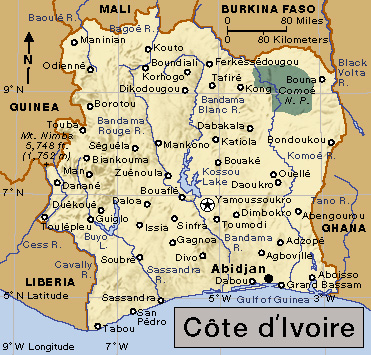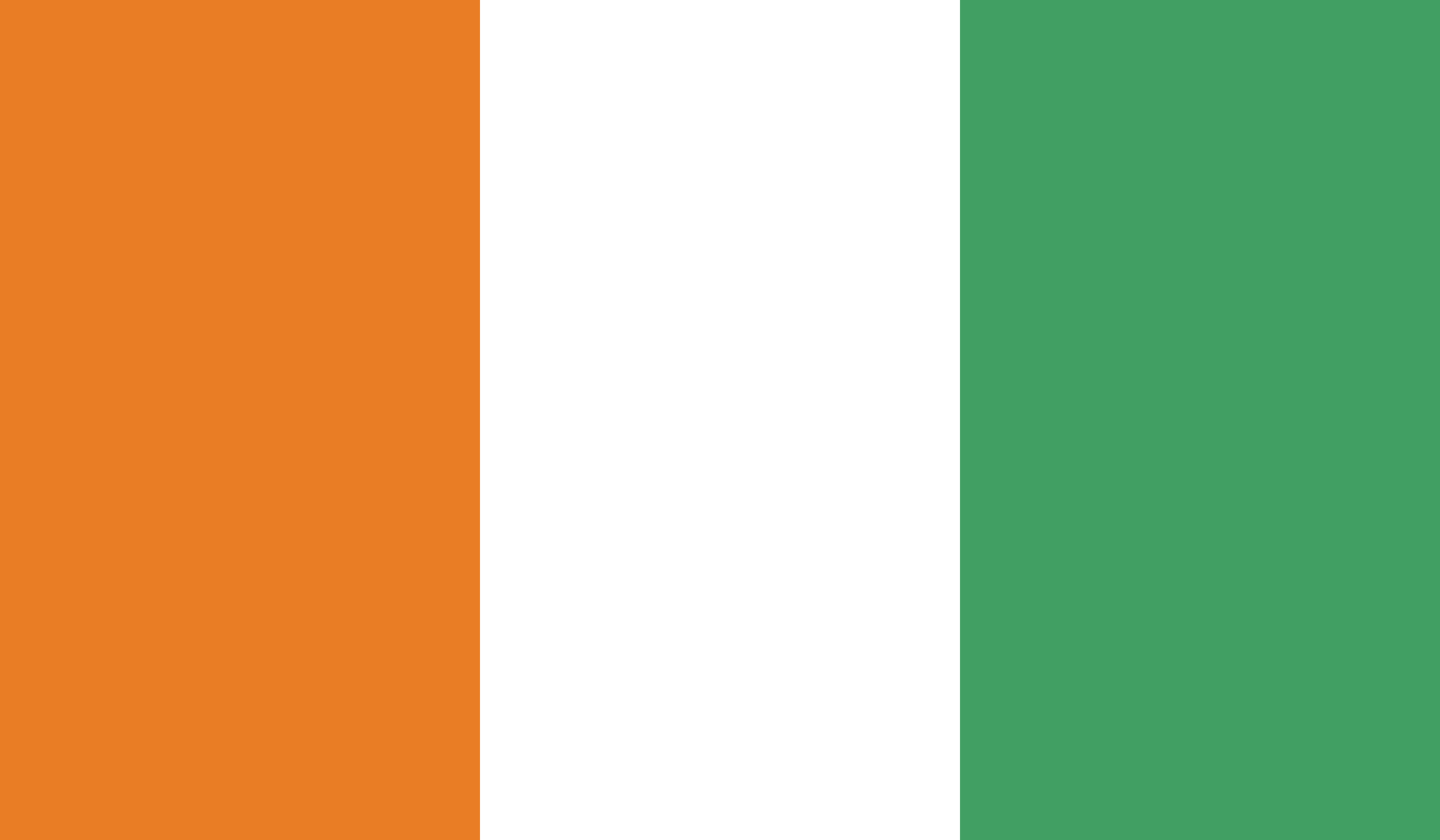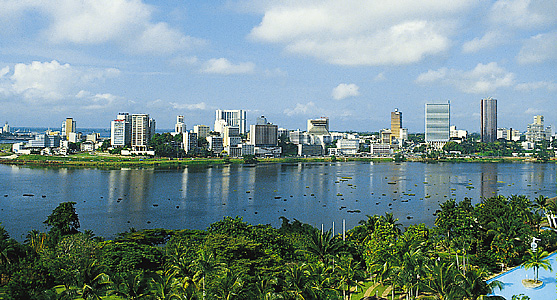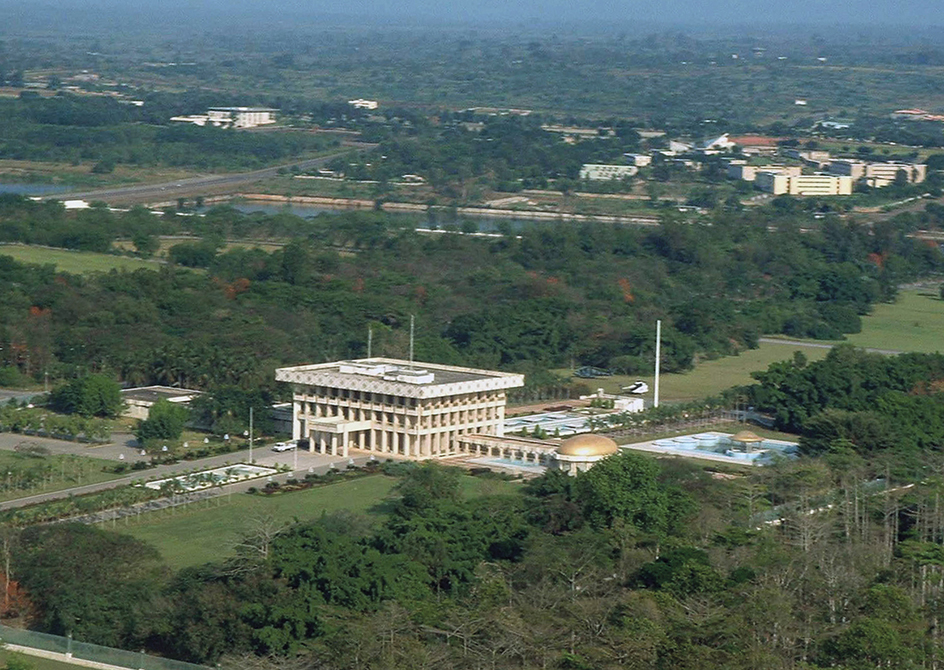Côte d’Ivoire << koht dee VWAR >>, also known as Ivory Coast, is a country that lies along the Gulf of Guinea on the west coast of Africa. It is bordered by Burkina Faso, Mali, Ghana, Guinea, and Liberia. The country’s official name is République de Côte d’Ivoire, which is French for Republic of the Ivory Coast. The name refers to the coastal trade in elephant tusks, which was important to the region for many years. Today, declines in the elephant population have led to bans on the ivory trade.

During the European conquest of Africa, France gained control of much of the western part of the continent. Côte d’Ivoire was declared a French colony in 1893. However, due to resistance from the area’s people, France did not fully control Côte d’Ivoire until about 1915. Côte d’Ivoire gained independence in 1960.
Yamoussoukro is the capital of Côte d’Ivoire. However, most government business takes place in Abidjan, the economic center and former capital of the country. Abidjan is also Côte d’Ivoire’s largest city and main port.
Government.
According to the Constitution adopted in 2016, the president is Côte d’Ivoire’s highest government official. The president is elected by the people to a five-year term. The president appoints a vice president, a prime minister, and other ministers to help carry out the functions of government. According to the Constitution, Côte d’Ivoire has a bicameral (two-house) legislature, consisting of the National Assembly and the Senate. Members of both houses are elected to five-year terms. The National Assembly is elected by the people. The president appoints one-third of the members of the Senate. The other two-thirds are indirectly elected.

People.
The people of Côte d’Ivoire—called Ivorians—can be divided into four main cultural groups: (1) the Akan peoples in the southeast, (2) the Kru in the southwest, (3) the Voltaic in the north and northeast, and (4) the Mandé in the west-central and northwestern regions. These four groups are made up of more than 60 smaller groups, including the Baoulé, Bété, and Senufo.
Loading the player...Côte d'Ivoire's national anthem
Since the mid-1900’s, a large number of immigrants, mainly from Burkina Faso, Mali, and Guinea, have moved to Côte d’Ivoire. The population also includes many people of Lebanese or French descent.
French is the official language of Côte d’Ivoire. But the Jula (also spelled Dyula) language, which is used in trade, is the country’s most widely spoken language.
About half of all Ivorians live in small villages. The villages typically consist of several compounds. Each compound is made up of groups of homes that house members of an extended family. An extended family is one that includes such relatives as parents, married children and their offspring, aunts, uncles, and cousins. Village houses generally have mud walls and thatched or metal roofs. In the cities, sharp contrasts exist between middle- and upper-income households and poor households in housing, health, employment, and education.
About two-fifths of Côte d’Ivoire’s people are Muslims, and about one-third are Christians. Many Ivorians practice traditional African religions.
Nearly half of Ivorians 15 years of age and older can read and write. Félix Houphouët-Boigny University (formerly the University of Cocody) in Abidjan is one of the nation’s chief institutions of higher learning.
The land
of Côte d’Ivoire rises gradually from the Atlantic Ocean. The eastern part of the coast is flat and sandy. A sand bar, no more than 4 miles (6 kilometers) wide, extends west from the neighboring country of Ghana for 180 miles (289 kilometers) along the coast. Behind the sand bar lie deep lagoons. The western part of the coast has small, rocky cliffs. Beyond the coastal strip is a tropical forest, from 95 to 185 miles (153 to 298 kilometers) wide. Through the years, much of the forest has been cleared to make farmland. In the north, the forest changes to savanna (grassland with scattered trees). The Guinea highlands, hills covered by forests, rise above 5,000 feet (1,500 meters) in west-central Côte d’Ivoire.

The major rivers of Côte d’Ivoire are the Bandama, the Cavally, the Comoé, and the Sassandra. The 500-mile (800-kilometer) Bandama is the longest.
The climate of Côte d’Ivoire is hot and humid. Temperatures in the coastal region vary from 76 to 83 °F (24 to 28 °C), and annual rainfall ranges from 79 to 128 inches (201 to 325 centimeters). The central forest region and the northern savanna have a wider range of temperatures and somewhat less rainfall.
Economy.
Agriculture is Côte d’Ivoire’s most important economic activity. The country is the world’s leading producer of cacao beans, which are used to make chocolate. It is among the world’s leading producers of cashews, palm oil, and yams. Ivorian farmers also grow bananas, cassava, coffee, corn, cotton, natural rubber, and rice. They raise cattle, chickens, goats, and sheep. The country’s forests produce much timber for export and domestic use.
A number of industries and manufacturing plants process Côte d’Ivoire’s raw products. These operations include petroleum refining; the processing of palm oil, pineapples, and tuna; and the production of textiles. The country mines diamonds, gold, natural gas, and oil.
History.
In ancient times, the area that is now Côte d’Ivoire was the site of many powerful kingdoms. These kingdoms included the Kong, Bouna, Gayman, Kabadugu, and Sanwi.
Beginning in the early 1700’s, the French established trading posts along the coast, where local and European goods were traded. A number of treaties in the mid-1800’s favored the French and gave France sovereignty over much of the coastal area. In the 1890’s, French troops with African soldiers—many of whom were drafted from other French-controlled areas—conquered the northern savanna. France declared Côte d’Ivoire a colony in 1893.
Many French settlers established coffee and cacao plantations and obtained logging rights in the Côte d’Ivoire colony. The French forced Africans to work for little or no pay on these operations. Africans were also forced to supply labor for public works projects, such as roads and railroads. To ensure a steady supply of low-cost labor in Côte d’Ivoire, France attached a large part of its colony of Upper Volta (now the country of Burkina Faso) to Côte d’Ivoire from 1932 to 1947. The French policies toward African laborers caused anticolonial sentiments in Côte d’Ivoire to grow.
During World War II (1939-1945), feelings of nationalism increased among the people of Côte d’Ivoire. In response, France carried out a number of political and economic reforms in the colony. In 1946, African members of the French National Assembly succeeded in getting legislation passed that ended the policy of forced labor. These reforms, along with high market prices, led to the expansion of African-owned coffee and cacao farms.
Côte d’Ivoire became independent in 1960. Félix Houphouët-Boigny, a leader of the anticolonial movement of French territories in western Africa, became Côte d’Ivoire’s first president. Still, the country maintained strong ties with France. 
Houphouët-Boigny served as president until his death in 1993. Henri Konan Bédié, the president of the National Assembly, succeeded him. In 1995, Bédié was elected to a full term as president. In 1999, military officers rioted and overthrew Bédié, setting up a transitional government with General Robert Gueï as president.
In July 2000, voters approved a new constitution designed to return the country to civilian rule. Presidential and legislative elections were held later that year. In October, when it appeared that presidential candidate Laurent Gbagbo would defeat Gueï, Gueï shut down the election commission and declared himself the winner. Mass protests in Abidjan followed, and Gueï was forced to leave office. Gbagbo was then sworn in as president.
Alassane Ouattara, who was prime minister from 1990 to 1993, had been barred from running in elections because of doubts about his nationality. Opponents claimed that one of his parents was from Burkina Faso, but Ouattara denied the claim. Ivorian law required presidential candidates to have been born in Côte d’Ivoire to parents who were both Ivorian themselves. From late 2000 to early 2001, clashes took place between Ouattara supporters and Gbagbo supporters.
In 2002, a group of soldiers rebelled and attempted to overthrow the Gbagbo government. Although the coup attempt failed, the rebels seized control of most of northern Côte d’Ivoire. That same year, two separate rebel uprisings began in western Côte d’Ivoire. Hundreds of people died in the violence.
In 2003, the three rebel groups, the Ivorian government, and opposition parties agreed to form a power-sharing government. All sides agreed to a cease-fire in May, though several breakdowns in the peace process followed. Most of northern Côte d’Ivoire remained under rebel control. On separate occasions, the rebels and opposition parties withdrew in protest from the power-sharing government for several months. The rebels demanded equal rights for northern Ivorians and additional rights for people of foreign origin. They refused to disarm until these reforms were made.
Gbagbo broke a cease-fire in 2004 and attacked the rebels. One air strike killed several French troops who were in the country as peacekeepers. In response, French forces destroyed most of the Ivorian military’s planes. Protests against the French erupted in Abidjan, but they were put down by French troops.
Government, rebel, and opposition leaders agreed to another cease-fire and to eventual disarmament in 2005. In addition, Gbagbo agreed to a rebel demand to allow Ouattara to run in the next presidential election. Still, some violence continued in western Côte d’Ivoire. In September, Gbagbo postponed the scheduled presidential election because the rebels had not disarmed. A plan drafted by the African Union and endorsed by the United Nations allowed for Gbagbo to stay in office for up to one year after Oct. 30, 2005, the end of his term, pending an election.
In the following years, disagreements about voting eligibility caused the election to be postponed further. Following a presidential election in 2010, both Gbagbo and Ouattara claimed victory. Many countries and international organizations, including the African Union and United Nations (UN), endorsed Ouattara’s victory, but Gbagbo refused to give up power. Some 3,000 people died in violence that erupted between the supporters of the two presidential contenders. Ouattara was sworn in as president in May.
In 2011, fighters loyal to Ouattara, assisted by French and UN troops, captured Gbagbo and placed him under arrest. Gbagbo was transferred to the International Criminal Court (ICC) in The Hague, the Netherlands. He faced charges of crimes against humanity committed during the violence following the 2010 presidential election. In 2019, the ICC found Gbagbo innocent of all charges. However, he had been sentenced in absentia (while absent) in Côte d’Ivoire for economic crimes committed after the 2010 election. In 2021, Gbagbo returned to Côte d’Ivoire, where he faced a prison term.
Ouattara was reelected as president in 2015. In 2016, a new constitution was approved in a referendum (direct vote by the people). The Constitution created a second legislative house, called the Senate, as well as the post of vice president. Violence erupted surrounding the 2020 presidential election, in which Ouattara won a third term. Dozens of people were killed and hundreds were injured in clashes between the government and Ouattara’s opponents. In 2022, Ouattara pardoned former president Gbagbo for his economic crimes. He claimed to do so in order to strengthen national unity.
